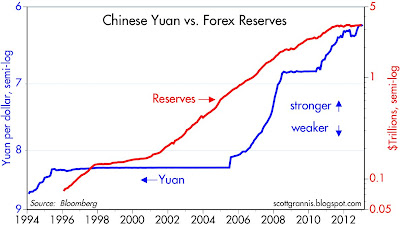After more than 15 years of steady gains, China's foreign exchange reserves have been effectively unchanged at about $3.3 trillion for the past 18 months. Moreover, for the past two years, China's holdings of Treasuries have also been effectively unchanged at about $1.2 trillion. China is no longer accumulating foreign exchange reserves because it no longer needs to keep its currency from appreciating. We're likely quite close to the end of the ever-appreciating yuan.
After appreciating by 68% in real terms against a broad basket of currencies (as shown in the chart above), the yuan apparently has no need to appreciate further. The huge effective appreciation of the yuan relative to other currencies has meant that the cost of making stuff in China is now much higher relative to other country's costs. Capital is thus no longer flooding into China, and in fact, jobs are starting to leave China for cheaper destinations. China has achieved a measure of foreign trade stability.
The money that China was spending on Treasuries and other hard-currency bonds is now available to spend on goods and services from around the world. Indeed, since China stopped accumulating Treasuries in mid-2010, U.S. exports to China have grown at a 13% annualized rate. So here's the answer to all those who worried for so many years: "What will happen if the Chinese stop buying our Treasury debt?" It's simple: when they stop buying our debt they will instead buy our goods and services. And if China should want to reduce its holdings of Treasuries, then it will perforce buy even more of our goods and services. This is simply international balance of payments math.
A little over two years ago I wrote a post titled "Pity the Chinese," in which I said "Contrary to what you read in the press—which mistakenly believes that our large trade deficit with China is something we need to worry about—China is the one that needs to worry, not us."
They sell us mountains of cheap goods, then turn around and invest most of the proceeds (equivalent to our trade deficit with China) in U.S. Treasury securities. We get the goods, and we get to keep the money.For most of the past 10 years, the U.S. has been working hard to depreciate its currency, in the mistaken belief that easy money and a cheaper dollar would stimulate the economy. China, in contrast, has been forced by relentless capital inflows and political pressure to revalue its currency even as it bought up massive amounts of foreign currency in an attempt to slow the yuan's rise. The result has been very costly for the Chinese, since they have put trillions of dollars of wealth into bonds with very low interest rates, denominated in currencies that have lost value against the yuan. In this manner, the Chinese have effectively transferred a significant amount of their wealth to other countries.
It really has been a pity, but at least now it looks like things won't be getting any worse.







4 comments:
Fabulous insight.
Unfortunately, with China not buying more Treasuries, the Fed will replace them. The U.S. is hell bent on increasing the money supply even if foreigners won’t provide it. I know. Increased imports from China increases the money supply. And in a really good way because the flow is to the private sector not the government.
In 1985 MZM was 24% of GDP.
In 1995 MZM was 32% of GDP.
MZM velocity rose dramatically between 1985 and 1995.
In 2012 MZM was 84% of GDP.
MZM velocity dropped dramatically between 1995 and 2012.
More money supply via foreign purchases of bonds and Fed money means more government means less velocity.
The market forced China to change and the market will force the U.S. to change.
Are we still 1000% long AAPL?
Darn Apple Computer. The market will open way down tomorrow. The price has stopped at 10% down. At least for now. I hope it recovers a lot before dawn. I don't own it but I own the market on a short term trade. It will take a lot of profti away.
Hi Scott - Thanks as always for great data and charts. Just a minor point, I don't think you can logically add a 7% earnings yield to a 7% historical price appreciation to get 14% potential return. Even if past history repeats, I think the numbers just don't work that way. That's kind of like double counting. The historical price appreciation has partly been fueled by the earnings yield through buybacks, investing in growing the businesses, etc. In fact, one might argue that since we are close to historical average P/E (close to average earnings yield), then the 7% current earnings yield suggests we will match the 7% historical price appreciation going forward (on average, over long times). Of course there are many other factors, but this is one way to look at it.
Post a Comment